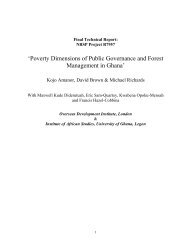The Gambian Tourist Value Chain and Prospects for Pro-Poor Tourism
The Gambian Tourist Value Chain and Prospects for Pro-Poor Tourism
The Gambian Tourist Value Chain and Prospects for Pro-Poor Tourism
Create successful ePaper yourself
Turn your PDF publications into a flip-book with our unique Google optimized e-Paper software.
<strong>Tourism</strong> in <strong>The</strong> Gambia: International ‘Best Practice’ in Poverty Reduction & <strong>Pro</strong>-<strong>Poor</strong> Growth Through <strong>Tourism</strong><br />
Draft Report (Friday 22 nd December 2006)<br />
these constraints on the employment of non-<strong>Gambian</strong> management align with government’s<br />
commitments to ECOWAS<br />
Box 6: <strong>Pro</strong>-<strong>Poor</strong> <strong>Tourism</strong> Regulatory Issue # 5<br />
Ensure that the Pay Roll Tax <strong>and</strong> Expatriate Quota Authority are consistent with Gambia’s<br />
recent commitments to ECOWAS.<br />
An unusual feature of the West African tourism sector is the high proportion of men<br />
employed by the sector. Anecdotal evidence suggests that the expenditure patterns of<br />
women’s earnings have a more developmental impact than <strong>for</strong> men’s earnings. <strong>The</strong>re is a<br />
developmental case, there<strong>for</strong>e, <strong>for</strong> the state focusing upon training women <strong>and</strong> reducing<br />
the obstacles to them entering the <strong>for</strong>mal tourism labour market.<br />
In a number of the Southern African settler states, sophisticated models of partnerships<br />
between private sector tourism stakeholders <strong>and</strong> poor, often rural, communities are<br />
becoming increasingly common. This reflects the nature of their ecotourism product <strong>and</strong><br />
the fact that significant tourism potential exists on l<strong>and</strong> which is held communally. This can<br />
be an additional source of benefit flow from tourist accommodation to poor communities,<br />
beyond the creation of jobs. In <strong>The</strong> Gambia circumstances are different. <strong>Tourism</strong> has<br />
traditionally been urban <strong>and</strong> either on private l<strong>and</strong> or on l<strong>and</strong> which the state expropriated<br />
from communities to <strong>for</strong>m the TDA.<br />
Notwithst<strong>and</strong>ing this, as the nature of the <strong>Gambian</strong> tourist product diversifies into poorer<br />
<strong>and</strong> more rural locations, it is likely that the <strong>for</strong>m of partnership through which the S<strong>and</strong>ale<br />
Eco-retreat is being developed can be replicated. As the l<strong>and</strong>owner in the TDA <strong>and</strong> with a<br />
practice of effectively giving away valuable tourism plots, the state is also in a very strong<br />
position to require some <strong>for</strong>m of ‘community gain’ through a partnership agreement on<br />
tourist developers. This could involve guarantees of local employment; a percentage of<br />
revenue or profit being distributed to a community trust <strong>for</strong> social investment or the<br />
community holding an equity position in the development, either from the onset or in the<br />
<strong>for</strong>m of a transfer after a fixed period. <strong>The</strong> publication of guidelines <strong>for</strong> the design of these<br />
types of partnerships can facilitate their adoption.<br />
Box 7: <strong>Pro</strong>-<strong>Poor</strong> <strong>Tourism</strong> Regulatory Issue # 6<br />
GTA consider whether to study international best practice on partnerships between tourism<br />
developers <strong>and</strong> local communities <strong>and</strong> publish guidance to encourage this practice in <strong>The</strong><br />
Gambia.<br />
<strong>The</strong> international experience suggests that these partnerships can work in stable, often<br />
rural, environments. However, such partnerships can exacerbate tensions within<br />
communities <strong>and</strong> the record suggests the delivery of benefits to the community is often<br />
much less than expected.<br />
5.2 Agricultural Supplies <strong>for</strong> Food <strong>and</strong> Beverages<br />
<strong>The</strong> purchase of agricultural supplies by hotels <strong>and</strong> restaurants is an important element of a<br />
pro-poor tourism strategy in <strong>The</strong> Gambia <strong>for</strong> several reasons.<br />
First, as outlined above, generating dem<strong>and</strong> <strong>for</strong> local agricultural produce is a key<br />
mechanism by which tourism can impact on the livelihoods of large numbers of poor<br />
people. In a country where 70% of the work<strong>for</strong>ce is engaged in agriculture, boosting<br />
agricultural supplies to hotels <strong>and</strong> restaurants is more likely to be successful in improving<br />
livelihoods than, <strong>for</strong> instance, transferring labour from the agricultural sector to a limited<br />
tourism sector.<br />
36

















